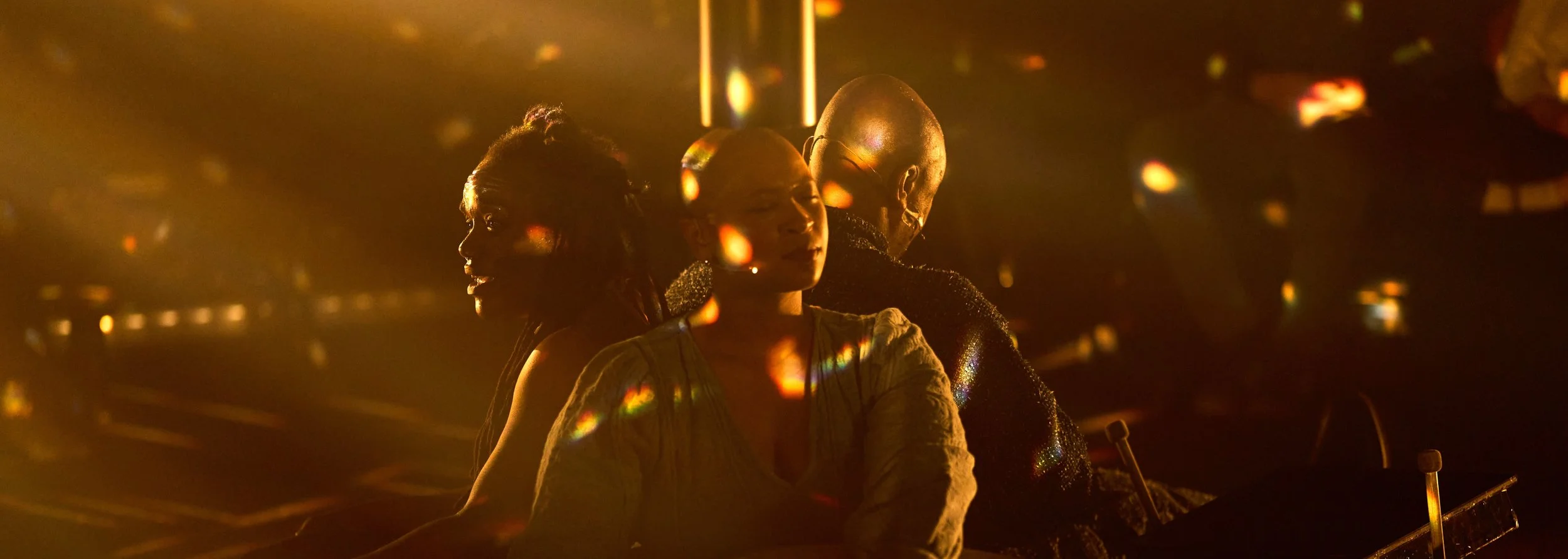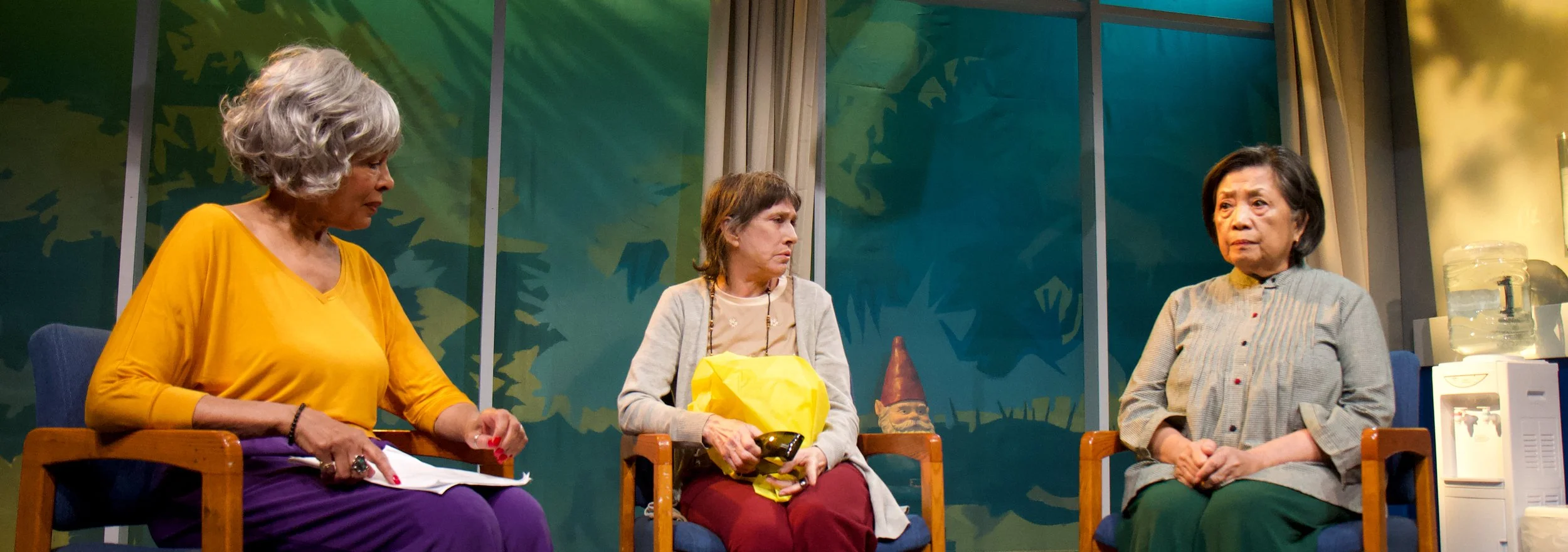In Edward, written, performed, and directed by Ed Schmidt, a small box of 27 mundane artifacts becomes a form of domestic archaeology, each item revealing a fragment of a life once lived. Gathered around a table in independent bookstores across New York City, audiences help reconstruct—night by night—a portrait of the late Edward O’Connell, a former high school English teacher whose faith in literature echoes through the stories and the spaces where they are told.
The Bookstore
Michael Walek’s The Bookstore is a cozy, unprepossessing play about the power of literature to change one’s life and the importance of both writing and reading. It is also about the people who do one or the other, and those who try to do both, and it’s peppered with nuggets about writers, readers, and the spectrum of human experience.
Dream Feed
Dream Feed, currently at HERE, is a poetic meditation on the theme of dreams. Performed by the two-time Grammy Award–winning theatrical family band the HawtPlates (Jade Hicks, Justin Hicks, and Kenita Miller-Hicks), the production utilizes sound and song to bring subconscious ideas to the surface.
The Disappear
The Disappear feels like an incomplete puzzle: Its pieces don’t fit together. This new play, written and directed by Erica Schmidt, is overloaded with undercooked melodramatics and ideas.
Juxtapose | A Theatrical Shadow Box
A work that has been collaboratively devised by members of the Happenstance Theater troupe, Juxtapose | A Theatrical Shadow Box cites as its influences the artworks of Joseph Cornell and the French films Amélie (2001) and Mon Oncle (1958). The play, directed by Mark Jaster and Sabrina Selma Mandell, explores randomness and dissimilarity and focuses on the lives of tenants in a French apartment house through a series of scenes that can be identified from their artistic influences or simply enjoyed as charming vignettes arranged in visually striking tableaux. Either way, the result is a multilayered and curious work that is both thought-provoking and delightful.
Bob Marley: How Reggae Changed the World
Bob Marley: How Reggae Changed the World is a soulful solo journey that traces reggae’s roots and its global reverberations through the life and legacy of its most iconic figure. Written, performed, and directed by Duane Forrest, the show blends acoustic music, personal storytelling, and audience connection, allowing one to glimpse how Bob Marley’s message reshaped not only a genre, but lives.
Night Stories
The Holocaust is never light fare for anyone, and it may be presumptuous to say, but its darkness is no more acutely felt than by those who survived it. The Congress for Jewish Culture’s production of Night Stories: Four Tales of Reanimation dramatizes the Yiddish poems of Avrom Sutzkever, widely acknowledged as the most eloquent Holocaust poet. Sutzkever’s poems, which depict the ghetto in Vilnius, Lithuania, under Nazi occupation, reflect the emotional roller coaster of its residents’ existence, pivoting among horror, humor, and an ambivalent desire for both death and redemption.
Predictor
Playwright Jennifer Blackmer takes great pains to jazz up a history lesson in Predictor, her tribute to the unheralded woman who created the home pregnancy test, Meg Crane. The chronological account of Crane’s invention is interspersed with musical and joky skits, as well as scenes representing Crane’s thoughts or flashbacks in her life.
Tartuffe
Molière’s Tartuffe is robustly reimagined by Lucas Hnath in a randy new version directed by Sarah Benson, turning the classic comedy of hypocrisy into a breathless, contemporary satire. With choreography by Raja Feather Kelly and a fearless cast led by Matthew Broderick and David Cross, the production unleashes ferocious wit and gleeful buffoonery.
Anna Christie
Anna Christie,Eugene O’Neill’s 1922 Pulitzer Prize drama, has been overshadowed by his late, great behemoths: Long Day’s Journey into Night and The Iceman Cometh are more often seen than the briefer play. Yet Thomas Kail’s enthralling production at St. Ann’s Warehouse makes a strong case for this neglected earlier work.
Picnic at Hanging Rock
The 1975 Australian film Picnic at Hanging Rock unfurls an atmospheric, unsettling little story of mysterious forces disturbing the titular outing, enjoyed by students at a Victoria, Australia, girls’ school circa 1900. In the movie, director Peter Weir keeps the proceedings eerie and foreboding as some of the girls on the picnic just vanish, leaving their classmates and the school personnel baffled and devastated. A well-deserved international success, Picnic at Hanging Rock grips the viewer even as not a lot happens: the film is all mood. The emotions are strong, but nothing about it screams, “I need to be sung.”
Gotta Dance
Gotta Dance, conceived by Nikki Feirt, is a choreographic musical revue of dances from Broadway shows—all performed by an expert cast of performers who sing and dance. The production, codirected by Feirt and Randy Skinner, flows well, and each number benefits from being staged by someone who had intimate knowledge of the original.
Everything Is Here
Peggy Stafford’s Everything Is Here explores the later stage of the life cycle—what some call the golden years, and others call the twilight years—by focusing on three women in their 70s: Bev (Jan Leslie Harding), Bonnie (Petronia Paley) and Janice (Mia Katigbak). Living in senior housing, they find their days are punctuated by the visiting nurse, Nikki (Suzannah Millonzi), who has a sadness beneath her cheerful demeanor, and the lanky and handsome Grant (Pete Simpson), who leads meditation and mindfulness classes at the home while he auditions for acting roles.
It’s a Wonderful Life! A Live Radio Play
When Frank Capra’s It’s a Wonderful Life premiered a few days before Christmas in 1946, New York Times reviewer Bosley Crowther was not exactly filled with glad tidings. “The weakness of this picture,” he bah-humbugged, “is the sentimentality of it—its illusory concept of life.” He observed that the small-town denizens represented in the film, “all resemble theatrical attitudes rather than average realities.” In a return engagement of Irish Repertory Theatre’s It’s a Wonderful Life! A Live Radio Play, Anthony E. Palermo’s adaptation of the film’s screenplay unapologetically leans into the sentimentality and accentuates the theatrical attitudes to deliver a sparkling and joyful Yuletide delight.
Laowang: A Chinatown King Lear
Titles, even subtitles, sway playgoers’ expectations. Take, for instance, a recent press performance of Laowang: A Chinatown King Lear. Alex Lin’s new farcical melodrama zips relentlessly around jocose hairpin turns. The dialogue, stylishly delivered by a first-rate cast, is witty, urbane, and frequently arch. Yet the audience—presumably anticipating King Lear or something akin to that monumental tragedy—sat in suspended, churchlike repose throughout the play’s early scenes.
Diversion
Playwright Scott Organ excels at creating characters whose mistakes in their jobs and relationships lead to agonizing consequences. His 2020 drama, 17 Minutes, was a harrowing tale of a sheriff’s deputy in a crumbling marriage who failed to stop a mass shooting. For his new work, Diversion, Organ reunites with director Seth Barrish and the Barrow Group to focus on a close-knit nursing unit on the verge of unraveling. This quiet and absorbing think piece examines the hardship of opioid addiction and the post-traumatic stress of the COVID-19 pandemic.
The Surgeon and Her Daughters
Set in New York City—specifically Times Square and Ozone Park, Queens—The Surgeon and Her Daughters presents a powerful story of seemingly unrelated people whose lives are upended as they struggle with insecurity and grief. Chris Gabo’s script artfully follows characters who struggle, deceive, fight, joke, and hope while reckoning with what their lives have become. Director Adrienne Campbell-Holt skillfully guides the production for maximum cathartic effect.
Meet the Cartozians
Two different views of immigration and assimilation hold sway in Talene Monahon’s Meet the Cartozians. Directed and expertly cast by David Cromer, the first half of Monahon’s play finds a naturalized Armenian American defending his citizenship in a landmark court case in 1925. In the second part, set a century later, the Armenian community has both thrived and splintered.
What If They Ate the Baby?
In the U.S. premiere of What If They Ate the Baby? writer-performers Xhloe Rice and Natasha Roland spin a seemingly polite 1950s housewife visit into a hilariously sinister dance of casseroles, secrets, and suburban dread. This queer clown two-hander uses absurdist comedy to probe surveillance, paranoia, and the pressures of American womanhood.
Gruesome Playground Injuries
Put two single beds side by side, and the stage is set for a romantic comedy. But what if they are hospital beds? Could a depressing drama be on tap? Not to worry. Rajiv Joseph’s 2009 oddity, Gruesome Playground Injuries, returns to Off-Broadway with plenty of laughs, missed connections, and fleeting kisses. And when things do, on occasion, turn grim, the solid acting, ample stage blood, and traces of vomit make this piece more of a shocker than a bummer. In the reliable hands of veteran director Neil Pepe, it’s a slice-of-life one-act with the emphasis on slice.





















